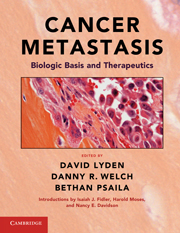Overview: Biology Is the Foundation of Therapy
Published online by Cambridge University Press: 05 June 2012
Summary
After a diagnosis of primary cancer is established, the urgent question is whether the cancer is localized or if it has already spread to the regional lymph nodes and distant organs. Despite improvements in surgical techniques, general patient care, and local and systemic adjuvant therapies, most deaths from cancer still result from the progressive growth of metastases that are resistant to conventional therapies.
The process of tumor metastasis is highly selective and consists of a series of sequential, interrelated steps, all of which must be completed by metastatic cells to produce clinically relevant lesions. After the initial transformation and growth of cells, vascularization must occur if a tumor mass is to exceed 1 mm in diameter. Next, local invasion of the host stroma occurs as a consequence of the enhanced expression of a series of enzymes such as collagenase. After the invading cells penetrate the lymphatic or vascular channels, they may grow there, or a single cell or clumps of cells may detach and be transported within the circulatory system. The tumor emboli must survive immune and nonimmune defenses and the turbulence of the circulation, then lodge in the capillary bed of receptive organs, extravasate into the organ parenchyma, proliferate, and establish a micrometastasis. Finally, the growth of these microscopic lesions requires development of a vascular supply and evasion of host defense cells.
- Type
- Chapter
- Information
- Cancer MetastasisBiologic Basis and Therapeutics, pp. xvii - xviiiPublisher: Cambridge University PressPrint publication year: 2011



